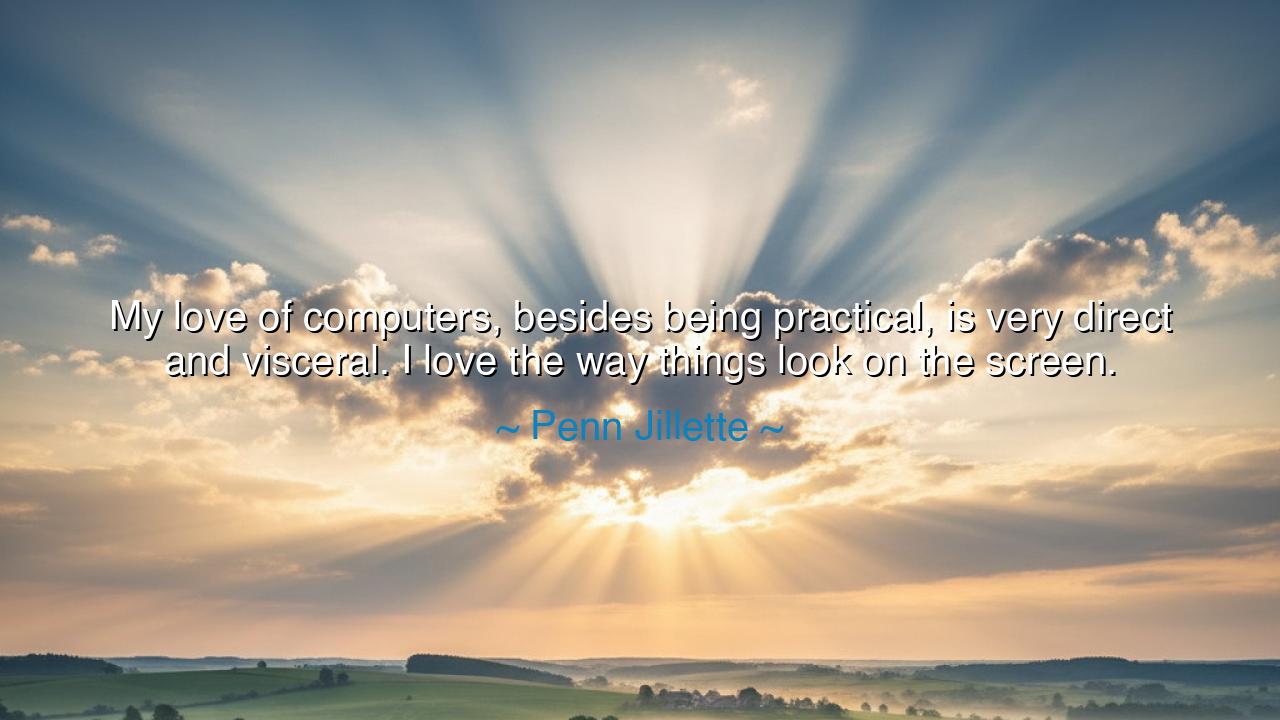
My love of computers, besides being practical, is very direct and
My love of computers, besides being practical, is very direct and visceral. I love the way things look on the screen.






“My love of computers, besides being practical, is very direct and visceral. I love the way things look on the screen.” — Penn Jillette
Hear now the words of Penn Jillette, a magician of both art and intellect, who in this saying reveals a truth that touches the heart of creation itself. He speaks not merely of computers, nor of technology alone, but of the deep, visceral love one feels when the tools of the mind become instruments of beauty. His confession is both simple and profound: that beyond function and practicality lies aesthetics, the joy of seeing order arise from chaos, of watching light and color obey the whisper of thought. For the screen is not a mere machine — it is a mirror of imagination, where the invisible becomes visible, and where mind takes form.
In the ancient days, the artist had his chisel, the scribe his ink, and the musician his lyre. Each looked upon his craft not only as work, but as wonder — for the shaping of creation has always stirred the soul. So it is with the modern dreamer and his computer. Where once the marble was cold and unyielding, now the screen glows with infinite potential. To those who see only wires and glass, it is a tool; but to those like Jillette, it is a living canvas, humming with the breath of possibility. His words are a hymn to this union of art and machine, to the joy that arises when beauty meets precision, when creativity dances with code.
Penn Jillette, known to the world as half of the duo Penn & Teller, is a man of paradox — a skeptic who believes in wonder, a magician who reveals truth. His love of computers reflects this dual nature. In the glowing screen, he finds both reason and mystery — the logic of circuits and the poetry of pixels. He speaks of a love that is not detached or abstract, but direct and visceral, like the thrill of fire in one’s hands. To him, technology is not distant or sterile; it is sensual, alive, a gateway through which creativity flows unbounded. His words remind us that passion for technology is not cold calculation, but the same fire that drove the sculptor’s hand and the poet’s heart.
Consider the story of Ada Lovelace, the enchantress of numbers, who saw in the analytical engine not a machine of mere arithmetic, but a machine of imagination. While others saw gears and levers, she saw music, art, and pattern — a device that could one day weave tapestries of sound and thought. Her love, like Jillette’s, was both practical and visceral — the union of intellect and intuition. She understood that to truly create with machines, one must not only command them but also feel them — to love the glow of logic as one loves the glow of dawn. Such is the spirit that binds past to present: the eternal awe of creation made tangible.
In this modern age, many see computers as tools of labor, engines of efficiency, or even harbingers of alienation. But Jillette’s vision restores the sacredness of their design. He reminds us that the beauty of the screen — its clarity, its depth, its light — can awaken wonder as surely as any painting or poem. It is not the device that holds meaning, but the eye that beholds it. When he says, “I love the way things look on the screen,” he speaks the language of the creator who delights in his medium — who sees art in the symmetry of code, in the harmony of color, in the living interplay of logic and light.
The lesson in Jillette’s words is this: that love and curiosity must be the foundation of our relationship with technology. The practical mind alone may command machines, but only the inspired heart can make them sing. To use technology without love is to live among wonders and never awaken to their beauty. Therefore, let each person who sits before a screen remember that they hold a window into infinity. Whether they write, draw, design, or simply explore, let them do so with reverence — seeing not only utility, but elegance; not only information, but illumination.
O student of the digital age, learn from Penn Jillette that creation is never purely mechanical. Every spark of invention carries the heartbeat of its maker. Fall in love, as he did, with the glowing pulse of the screen, with the quiet order of pixels, with the bridge between mind and matter. Let your interaction with technology be not cold and hurried, but visceral, alive, full of delight. For when you gaze upon that light and see more than data — when you see art, power, and possibility — then you are no longer a user of machines. You are a creator in the new dawn, shaping beauty from circuits, and bringing the ancient flame of imagination into the luminous age of code.






AAdministratorAdministrator
Welcome, honored guests. Please leave a comment, we will respond soon